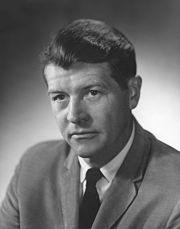User blogs

CHRISTIAN ANFINSEN – NOBEL LAUREATE IN CHEMISTRY
Nobel Prize: Christian Anfinsen (1916–1995) was awarded the 1972 Nobel Prize in Chemistry “for his work on ribonuclease, especially concerning the connection between the amino acid sequence and the biologically active conformation.” Anfinsen is a pioneer in the study of enzymes.
Nationality: American
Education: Ph.D. in biochemistry, Harvard University, 1943
Occupation: Professor of Chemistry at Harvard University and University of Pennsylvania; Researcher at Carlsberg University (Denmark), National Institute of Health (Bethesda) and National Institute of Arthritis, Metabolism and Digestive Diseases; Professor of Biology at Johns Hopkins University from 1982 until his death
1. To the question, “Many prominent scientists - including Darwin, Einstein, and Planck - have considered the concept of God very seriously. What are your thoughts on the concept of God and on the existence of God?” Christian Anfinsen replied:
“I think only an idiot can be an atheist. We must admit that there exists an incomprehensible power or force with limitless foresight and knowledge that started the whole universe going in the first place.” (Anfinsen, as cited in Margenau and Varghese, ‘Cosmos, Bios, Theos’, 1997, 139).
2. Prof. Anfinsen wrote to the compilers of the scientific anthology ‘Cosmos, Bios, Theos’ (1997) this:
“I enclose a favorite quotation from Einstein that agrees almost completely with my own point of view.
Einstein himself once said that ‘The most beautiful and most profound emotion we can experience is the sensation of the mystical. It is the sower of all true science. He to whom this emotion is a stranger, who can no longer stand rapt in awe, is as good as dead. That deeply emotional conviction of the presence of a superior reasoning power, which is revealed in the incomprehensible Universe, forms my idea of God’.” (Anfinsen, as cited in Margenau and Varghese, ‘Cosmos, Bios, Theos’, 1997, 140).
3. In his letter of 28 March 1989 to Prof. Henry Margenau (compiler of the scientific anthology ‘Cosmos, Bios, Theos’), Anfinsen wrote:
“Thank you for your letter of March 13 and your kind words about my small contribution to your anthology. I can think of little more to add to my final point having to do with the nature of God and the existence of God. Clearly, an all-powerful, all-knowing entity must exist to explain our existence.” (Anfinsen 1989).
4. In 1979, Anfinsen converted to Orthodox Judaism, a commitment he retained for the rest of his life; he maintained that he had been deeply impressed by the “the history, practice and intensity of Judaism.”
On 16 November 1995, in her Memorial speech for Christian Anfinsen at Memorial Garden Dedication, Weizmann Institute, Libby Anfinsen (Prof. Anfinsen’s wife) said:
“His religious background is interesting in that his Jewish maternal grandmother’s family disappeared when the Nazis invaded Bergen, Norway. His parents were Bible reading Lutherans, and he himself was an agnostic until the later 70’s when he studied and converted to traditional Judaism. He felt the following quote from Einstein accurately expressed his beliefs. ‘The most beautiful and most profound emotion we can experience is the sensation of the mystical. It is the sower of all true science. He to whom this emotion is a stranger, who can no longer stand rapt in awe, is as good as dead. That deeply emotional conviction of the presence of a superior reasoning power, which is revealed in the incomprehensible Universe, forms my idea of God.’ He xeroxed and distributed this quote to many.” (Libby Anfinsen, 1995).
